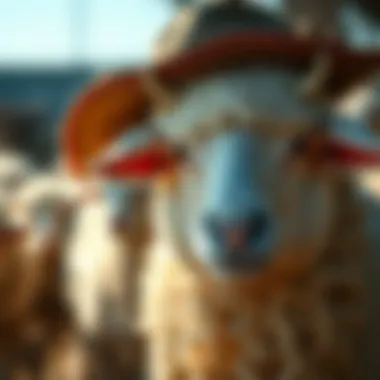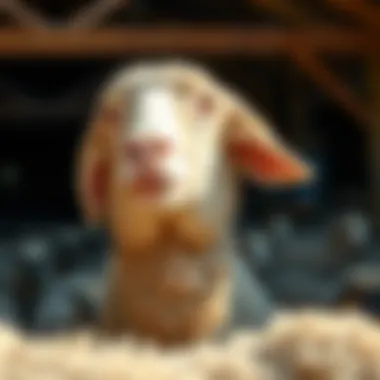Exploring Careers in Sheep Farming: Roles and Opportunities


Intro
The world of sheep farming is a multifaceted domain that often goes overlooked in broader agricultural discussions. As a cornerstone of sustainable agriculture, it plays a crucial role in various aspects of the farming industry. This article will delve into the careers available within sheep farming, outlining the responsibilities of sheep farmers, the necessary skills, and the economic realities of the field.
The significance of sheep farming extends beyond merely raising animals for wool and meat. It involves intricate processes that can contribute to environmental sustainability, animal welfare, and efficient resource management. In this exploration, we'll touch on challenges such as market fluctuations, disease management, and the evolving economic landscape, ensuring a rounded perspective.
Research and Data Analysis
Sheep farming doesn't occur in a vacuum. Understanding the current trends and analyzing relevant data is essential for anyone looking to thrive in this field.
Latest Trends in Agriculture and Horticulture
Recent years have seen a shift in agricultural methods, with a stronger focus on sustainable practices. Farmers are increasingly adopting techniques that not only enhance productivity but also minimize environmental impact. This includes rotational grazing, where sheep are moved between pastures to allow land recovery and prevent overgrazing. Furthermore, digital farming tools are making their way into sheep farming, providing farmers with data-driven decisions to improve efficiency.
Modern sheep farming isn't just about raising sheep; it's about raising them with a sustainable vision.
Statistical Insights into Sheep Farming
A few statistics highlight the state of sheep farming:
- In 2021, the global sheep population was approximately 1.12 billion.
- The sheep industry provides over 30 million tons of meat annually, with mutton and lamb accounting for the bulk of production.
- Wool production from sheep contributes around $5 billion to the global economy each year.
These figures indicate not only the industry's scope but also its potential for growth, especially as consumer demand shifts toward sustainably raised products.
Best Practices and Techniques
When embarking on a career in sheep farming, understanding best practices is pivotal.
Efficient Farm Management Strategies
Farm management involves various aspects:
- Animal Husbandry: Proper care of sheep is paramount. Familiarity with nutritional needs, breeding practices, and behavioral signs of health issues is crucial.
- Record Keeping: Keeping thorough records allows for better tracking of growth rates, breeding cycles, and veterinary care.
- Financial Management: Creating a comprehensive budget helps farmers anticipate costs and profits, crucial for long-term sustainability.
Sustainable Farming Techniques
Sustainable farming in the sheep sector focuses on methods that promote biodiversity and conserve resources. Practices include:
- Cover Cropping: Using plants to improve soil health and prevent erosion.
- Integrated Crop-Livestock Systems: This method synergizes crop and livestock production, allowing for better utilization of land and resources while enhancing livestock health.
Pest and Disease Management
Managing health challenges in sheep farming is a delicate balance.
Common Pests and Diseases in Sheep
Identifying and addressing the issues as soon as they arise is essential for the wellbeing of the flock. Common parasites include:
- Lice: These infestations can lead to itching and stress, affecting wool production.
- Foot Rot: This bacterial disease can significantly hinder a sheep's mobility and overall health, requiring proper hoof care and environmental management.
- Internal Parasites: Worm infestations can threaten sheep health and productivity, emphasizing rotational grazing and regular monitoring.
Integrated Pest Management Strategies
Effective pest management strategies involve:
- Regular Health Checks: Routine checks can help in early detection of issues.
- Vaccinations: These protect against common diseases in sheep.
- Grazing Management: Proper grazing can significantly reduce the presence of certain pests and diseases.
By integrating these practices, aspiring farmers can navigate the challenges of sheep farming more effectively, paving the way for a successful career.
Intro to Sheep Farming Careers
When discussing agricultural careers, sheep farming often doesn't surface as the first choice for many. However, sheep farming holds profound significance in the realm of sustainable agriculture, making it an area worth exploring. This field combines elements of animal husbandry, land management, and environmental stewardship, which presents both unique opportunities and distinct challenges.
The Significance of Sheep Farming
Sheep farming is not merely about raising animals; it’s a crucial pillar of agriculture that contributes to various sectors, including the textile industry for wool, culinary delights from lamb meat, and even health products like lanolin. Additionally, sheep serve as effective grazers, benefiting the ecosystem by managing grassland health and promoting soil fertility. This multifaceted impact renders sheep farmers essential to not just farming communities but the larger agricultural economy.
Importantly, sheep farming feeds into broader conversations about sustainability. With growing awareness around food sourcing, consumers are increasingly interested in how their food is produced. Sheep farmers often engage in practices that echo the principles of grazing rotations and organic farming, thereby appealing to a conscientious market. Moreover, sheep can thrive in diverse climates, adding resilience to farming systems in varying environments.


This section offers a glimpse into these complexities, setting the stage for a deeper understanding of the roles, responsibilities, and the invaluable contributions made by sheep farmers. The conversation about sheep farming careers is timely and critical, addressing the concerns of farmers facing environmental pressures as well as meeting the demands of evolving markets.
Historical Context of Sheep Farming
To really capture the essence of sheep farming, one must look back at its historical roots. The domestication of sheep dates back thousands of years, with evidence pointing to this as one of the first agricultural endeavors of human civilization. Initially, sheep were raised for their meat and skins, but as societies advanced, the significance of wool became more pronounced. In fact, wool trade spurred economic growth in various cultures, forging connections and stimulating commerce across continents.
Historically, different regions specialized in specific breeds, tailoring them to suit local climates and purposes. For instance, the Merino sheep, revered for its super-fine wool, played a pivotal role in the textile industry and was at the heart of trade between Europe and Australia. This evolution reflects changing priorities in agriculture and highlights the adaptability of farming practices.
Understanding this backdrop not only enriches our appreciation for modern sheep farming but also emphasizes how practices have evolved over time, responding to both cultural needs and environmental challenges. The innovations and traditions that have shaped sheep farming create a lineage that is both inspiring and informative.
In summary, the significance and historical context of sheep farming not only reveal the layers behind this career but also underscore its vital role in sustainable practices and economic contributions, marking it as an area of exploration worth pursuing.
“Exploring the history of sheep farming allows us to appreciate the agricultural innovations that feed and clothe entire populations.”
For more in-depth insights into the historical developments in agriculture, consider resources like Encyclopedia Britannica or explore forums on Reddit.
Whether one seeks to start their own farm or simply wishes to understand the impact of sheep farming on society, this narrative serves as a crucial introduction to a career that is often overlooked yet immensely important.
Core Responsibilities of a Sheep Farmer
Understanding the fundamental roles that sheep farmers play is crucial for anyone interested in delving into the sheep farming industry. These responsibilities set the stage for successful farming operations and contribute significantly to the overall sustainability and efficiency of the agriculture sector. At the heart of sheep farming lies a blend of daily operations and intricate animal husbandry practices. Together, they create the foundation upon which thriving sheep farming enterprises are built.
Daily Operations
Daily operations in sheep farming encompass a range of tasks that are essential for the well-being of the flock and the efficient functioning of the farm. Farmers must tend to their sheep at various times throughout the day, ensuring they have adequate food and water, monitoring health conditions, and performing other routine checks. The day might kick off with a stroll through the pastures to herd the sheep, or it could involve feeding rations that are tailored to their nutritional needs. As mundane as these tasks may seem, they are critical for maintaining the animals' health and productivity.
The following tasks are often part of a sheep farmer’s daily routine:
- Herd Management: Daily monitoring of sheep ensures that any health issues are caught early. Farmers must be attuned to the behavior of their flock, as changes can signal sickness or distress.
- Feeding and Nutrition: Farmers need to provide a balanced diet, taking into account the breed, age, and purpose of the sheep—be it for wool, meat, or breeding.
- Record Keeping: Maintaining accurate records of breeding, health, and feed usage not only helps in tracking productivity but is also important for any certifications and audits required in commercial farming.
The consistent engagement in these operations allows farmers to build a rapport with their sheep, facilitating better management and welfare practices.
Animal Husbandry Practices
Animal husbandry, the branch of agriculture that deals with the care and breeding of animals, forms the backbone of successful sheep farming. Effective husbandry practices involve understanding the health, breeding, and overall welfare needs of the sheep.
For sheep farmers, this translates to:
- Health Management: Regular vaccination programs and health checks are essential to keep disease at bay. Farmers must stay updated on common diseases like foot rot or parasites and have protocols in place to manage outbreaks.
- Breeding Programs: Selecting the right rams and ewes for breeding can significantly influence the flock's productivity. Judicious decision-making in breeding practices aids in developing desirable traits, such as better wool quality or improved meat yield.
- Wool Harvesting: Shearing is not just about collecting wool; it’s an art that should be performed at the right time and using proper techniques. Farmers must also educate themselves on fiber types and quality, as the market for wool can be competitive.
Incorporating sustainable practices into animal husbandry not only benefits the sheep but also the environment. For instance, rotational grazing can improve soil health and forage quality while fostering biodiversity.
"Effective animal husbandry practices represent the bridge between ethical farming and agricultural productivity."
In essence, the core responsibilities of a sheep farmer stretch far beyond merely managing a flock. These tasks require a deep-seated commitment, knowledge, and innovative thinking to ensure that the art of sheep farming is practiced sustainably and productively. Whether it's daily chores or thoughtful breeding choices, the responsibilities carry with them significant implications for the future of agriculture.
Essential Skills for Success
In the world of sheep farming, having the right skills can make all the difference between a thriving enterprise and one that struggles to stay afloat. As the agricultural landscape continues to shift, both in response to technology and changing consumer demands, the importance of successful skills stands tall. Farmers not only need to tend to their flocks but also adapt to ever-evolving practices for sustainability and efficiency. Key skills enable farmers to navigate these waters, allowing for both personal and professional growth.
Technical Skills
Technical skills sit at the very core of sheep farming. This includes an understanding of veterinary care to manage the health of the flock. Knowing how to identify the early signs of common ailments can help mitigate losses before they escalate. It’s not just about reacting—it's also proactive management. Farmers might utilize tools such as electronic identification (EID) tags, which streamline administration while keeping track of each sheep's health history.
Farmers need to be adept at breeding techniques, understanding genetics, and employing the right methods for improving herd quality. For instance, they should recognize which traits to enhance for better wool quality or meat yield.
A good grasp of pasture management is also crucial. Different grasses and their growth patterns can significantly influence how much food is available for the flock. Thus, knowing when and how to rotate pastures helps maintain soil health and keep sheep thriving. Moreover, an understanding of sustainable practices can lead to a more profitable operation, as consumers increasingly value environmentally conscious approaches.
Management and Leadership Skills
Alongside technical knowledge, management and leadership skills are vital for any sheep farmer looking to expand or sustain their operations. Running a farm involves coordinating various day-to-day tasks, from feeding schedules to health care. If a farmer can’t juggle these effectively, it could lead to disaster—sheep may get sick, or resources could be wasted.
Effective leaders delegate work, while also motivating their teams to achieve a common goal. They also need to be adept in financial management, understanding budgeting, and accounting. This means being able to read market trends, comparing costs, and making educated decisions regarding investments in infrastructure or livestock.
Furthermore, farmers should have a finger on the pulse of community engagement. Building relationships with suppliers, vendors, and even fellow farmers can provide additional support and insight. Joining local agricultural organizations or cooperatives can open doors to new resources and perspectives that are immensely valuable.
Developing both technical and management skills is vital for establishing a successful sheep farming career and contributing positively to the agricultural community.


In summary, mastering the essential skills for success is not a walk in the park. However, those who invest time and effort into honing these abilities will likely find themselves better equipped to tackle the challenges of sheep farming and seize the opportunities it presents.
Economic Considerations in Sheep Farming
Sheep farming is not just a quaint rural occupation; it is a vital part of the broader agricultural economic landscape. Understanding the economic considerations is paramount for anyone looking to plunge into this career. Sheep farming can yield substantial profitability, but it's not without its complexities, which can make or break the venture.
When considering sheep farming, several financial elements come into play. For one, the initial investment is significant, from acquiring livestock to land and equipment. However, with a decent business plan, farmers can see their investments ripen over time. The challenges of fluctuating market prices, high input costs, and the unpredictability of climate can be daunting, but a keen understanding of these factors can aid in planning and strategy.
Financial Viability of Sheep Farming
Determining the financial viability of sheep farming involves analyzing multiple factors, including production costs, sale prices, and long-term profitability.
- Start-Up Costs: Initial expenses can be hefty. It involves buying sheep, fencing, housing, and feeding systems. But don't overlook government grants or programs that might help lighten this financial load.
- Operational Costs: Besides start-up costs, farmers need to budget for ongoing expenses such as feed, veterinary care, shearing, and labor force, if there’s one. Farmers should always keep an eye on their variable costs to ensure they remain competitive.
- Profit Margins: A successful sheep farm can generate not just income from lamb and wool sales, but also from value-added products like cheese or artisanal yarn. Success hinges on market research; knowing when and where to sell your products can significantly boost profits.
"Understanding your cost structure is as important as knowing your product. It's the backbone of profitability in sheep farming."
Market Dynamics and Demand Trends
The market for sheep products varies significantly based on consumer preferences and economic trends. Sheep farmers must keep a pulse on the market to navigate these waters effectively.
- Consumer Preferences: There is a growing trend towards organic and free-range products. If you can market your farm’s practices, it may lead to higher prices for your sheep and derived products. Likewise, understanding evolving tastes helps tailor your offerings.
- Demand Fluctuations: Like any business, sheep farming is subject to demand cycles. Those engaged in selling lamb meat and wool should pay attention to market trends and consumer demands. For instance, increased interest in sustainable livestock practices can lead to spikes in demand for organic wool.
- Global Market Influences: International trade agreements, tariffs, and fluctuations in currency can drastically affect sheep pricing. Farmers should be educated about their markets, domestically and globally.
In essence, entering into sheep farming without accurate economic insight can lead to pitfalls. By focusing on the financial viability, market dynamics, and demand trends, aspiring sheep farmers can better position themselves for success in this lucrative field. Whether you are standing on the brink of launching a farm or are already deep in the pastoral life, these economic considerations will undeniably affect your journey.
Challenges Faced by Sheep Farmers
The landscape of sheep farming is not just dotted with endless pastures and flocks of woolly sheep. Beneath the surface lies a complex set of challenges that every sheep farmer must grapple with. These challenges shape the day-to-day operations and long-term sustainability of sheep farming as a viable career. Understanding these difficulties is critical, as they can significantly impact not just farmers, but also the economy and ecology surrounding this essential agricultural practice.
Environmental Factors
Environmental factors stand tall as one of the main hurdles sheep farmers encounter. Mother Nature can be unpredictable. For instance, climatic changes such as droughts or excessive rains can drastically affect pasture availability and quality. A farmer might wake up to find a once lush green field converted into a muddy quagmire, making it next to impossible for sheep to graze.
Furthermore, varying temperatures can harm sheep health. Cold climates may lead to increased incidence of illness, particularly respiratory problems. The flipping of seasons can be quite the juggle for farmers. Sizing up when to shear wool or when to sell lambs becomes a strategic game influenced by climatic conditions.
It's not just about the weather, though. Land degradation due to overgrazing is another concern. If a farmer pushes the sheep beyond sustainable limits, soil erosion can occur, followed by the loss of soil nutrients. A farmer must strike a balance between maximizing production and maintaining the health of their land. Education on these issues is vital; government resources and local agricultural extensions can be invaluable assets. Tools like soil testing and livestock management can provide useful insights for achieving sustainability.
Health and Disease Management
Navigating the waters of health and disease management is like walking a tightrope for sheep farmers. Disease outbreaks can lead not only to the loss of livestock, but also to substantial financial setbacks. Conditions such as foot-and-mouth disease or enterotoxemia can spread swiftly within flocks, making vigilance an absolute necessity.
Farmers need to be well-versed in preventative practices, like vaccination schedules and nutrient management, to keep their sheep healthy. Constant monitoring of flock health can alert farmers to issues before they escalate.
Animal husbandry practices play a crucial part here. Farmers should carry out regular health checks, maintain proper hygiene and biosecurity measures, and implement nutritional programs to support overall flock wellbeing.
A robust health management plan often incorporates collaboration with veterinarians to tailor treatment and prevention strategies. Proactive measures can include the use of digital health trackers that log health data and alert farmers about abnormalities. The right technology is worth its weight in gold for sheep farmers looking to enhance their operations.
The challenges in sheep farming are not insurmountable, but they do require adaptability and continuous learning. With the right strategies, resources, and collaboration, sheep farmers can successfully navigate these waters, ensuring both their livelihood and the welfare of their flocks.
Advancements in Sheep Farming Techniques
The world of sheep farming is not just about raising sheep and shearing wool. It is an evolving field, marked by significant advancements that aim to improve yield, reduce operational costs, and enhance sustainability. These innovations are crucial, given the increasing demand for sheep products and the necessity for environmentally sound practices. Adopting new techniques enables farmers to stay ahead of the curve and ensure their operations are both profitable and sustainable.
Innovations in Breeding Practices
Breeding practices in sheep farming have witnessed a transformation, largely thanks to advances in genetic research and biotechnology. Farmers can now utilize selective breeding methods to produce sheep that not only have better fleece qualities but also superior meat yields. Techniques such as genomic selection allow for predicting the genetic potential of sheep with a much higher accuracy than before.
- Benefits: This leads to healthier flocks with improved disease resistance, better growth rates, and enhanced fertility.
- Considerations: However, farmers must approach this with care. Incorporating advanced breeding practices requires knowledge and often significant investment in technology. The balance between improving traits and maintaining genetic diversity is critical to avoid potential inbreeding issues.
Research organizations and agricultural universities are continuously working on breeding programs to help farmers implement these innovations. Resources like the American Sheep Industry Association provide tools and support for those looking to delve into advanced breeding methods.
Technological Integration in Farming
The integration of technology into sheep farming brings about a seismic shift in operations, making tasks easier and more efficient. From drones monitoring pasture conditions to smart collars tracking sheep movements, the focus is on data-driven decision-making. This means farmers can keep tabs on their flocks in real-time, noticing which sheep need additional care or which areas of pasture are not being utilized effectively.
Key elements of this integration include:
- Precision farming: Utilizing software and devices to optimize feed usage and monitor health indicators.
- Automated systems: Feeding systems and water supplies that adjust based on the needs of the sheep, minimizing waste and ensuring all animals receive adequate nourishment.
- Record keeping: Advanced software solutions help manage flock health, breeding history, and financials all from one platform.


The benefits of these technologies are manifold. Greater operational efficiency means better profit margins, while the data collected can also aid in making environmental decisions that support sustainability. However, the initial setup costs can be daunting for small-scale farmers, necessitating a careful evaluation of the expected return on investment.
Incorporating technology isn't just about being trendy; it's about responding to modern agricultural challenges. Various sources like Agricultural Innovations showcase the latest trends, offering insights that can help farmers decide which tech fits their operations best.
"With the proper advancements, sheep farmers can not only increase their productivity but also play a significant role in sustainable farming practices."
Career Pathways and Opportunities
Understanding the career pathways and opportunities in sheep farming is crucial for anyone looking to delve into this industry. The realm of sheep farming isn't just about herding sheep and tending to their needs; it's an intricate tapestry of roles and responsibilities that can lead to fulfilling careers. From starting your own farm to securing employment within agribusinesses, the opportunities are diverse. This section discusses some specific elements, benefits, and considerations associated with career pathways in sheep farming, helping aspiring farmers carve their niche.
Starting Your Own Farm
Embarking on the journey of starting your own sheep farm can be both exciting and daunting. It requires not only a passion for agriculture but also a solid understanding of the operational aspects involved. Firstly, financial planning is paramount. Setting aside sufficient capital for initial investments is critical; this includes purchasing land, sheep, and necessary equipment.
Additionally, you must be prepared to dive into the technical and practical skills of sheep farming. This encompasses understanding animal husbandry, nutrition, and breeding practices. It takes time and effort to learn how to manage a flock effectively. Many farmers recommend starting small. By beginning with a manageable number of sheep, it’s easier to gain hands-on experience without being overwhelmed.
Networking with local agricultural organizations can also provide crucial connection and support as you navigate regulatory requirements. For instance, securing permits, learning about the health regulations concerning livestock, and understanding zoning laws are a must. By tapping into community resources and programs, you’ll bolster your chances of a successful start.
Employment in Agribusinesses
For those who may not be inclined to start their own farms, there are plentiful job opportunities within agribusinesses related to sheep farming. Companies involved in livestock nutrition, veterinary services, and ranch management all seek skilled individuals who understand the nuances of sheep farming. Employment in agribusiness can often provide a steadier income and benefits, which can be appealing for those looking to build a career while contributing to the sheep industry.
Jobs can range from field assistants who work with farmers on a day-to-day basis to corporate positions in agricultural supply companies. Sales representatives for feed and health products, and positions in marketing and product development within agricultural companies are also viable options. Such roles allow you to engage directly with the products and systems that underpin sheep farming.
Working for an agribusiness also enhances your understanding of the broader industry context. You gain exposure to market trends, innovations in animal husbandry, and the economics of sheep production, all of which can enrich your career significantly. Moreover, many agribusinesses offer training programs and continuing education opportunities, ensuring employees stay up to date with the latest trends and technologies in the sector.
Starting your journey in sheep farming, whether by launching your own operation or working for an agribusiness, can lead to a fulfilling career. As the industry continues to evolve with advancements in practices and sustainability goals, being well-informed and engaged will open doors to prosperous opportunities in sheep farming.
Impact of Sheep Farming on Agronomy
Sheep farming carries significant weight in the realm of agronomy, intertwining with various agricultural practices to foster a productive environment. The role of sheep goes beyond producing wool and meat; they actively contribute to enriching the soil, managing weeds, and enhancing biodiversity, crafting a more sustainable agricultural narrative.
Sustainable Agricultural Practices
In the realm of sustainable agriculture, sheep farming provides multifaceted benefits. The grazing habits of sheep allow them to naturally maintain pasture health. When managed properly, these animals can effectively control invasive plant species, thereby promoting the growth of native grasses and other beneficial flora. This aspect of sheep farming is akin to nature's way of maintaining balance—there's no need to resort to chemical herbicides when you have a flock of sheep at your disposal.
Moreover, their byproducts, such as manure, serve as an excellent organic fertilizer that replenishes soil nutrients. This organic matter not only enhances soil structure but also increases its ability to retain moisture. Consequently, sheep contribute to preventing soil erosion and maintaining soil fertility over time.
Here's a list of key sustainable practices in sheep farming:
- Rotational Grazing: Moving sheep between pastures to prevent overgrazing and allow grasses to recover.
- Cover Cropping: Using cover crops to enrich soil fertility and stability, alongside sheep grazing.
- Integrated Pest Management: Reducing the use of pesticides by allowing sheep to graze on areas with pest problems.
Biodiversity Considerations
Aside from contributing to crop health, sheep farming plays a pivotal role in promoting biodiversity. The coexistence of livestock and crops creates a dynamic ecosystem where a variety of species can thrive. For instance, when sheep graze, they keep grasses trimmed, allowing sunlight to penetrate the soil and fostering the growth of a diverse range of plant species. This diversity, in turn, attracts various insects and birds, forming a balanced environment where each element supports the others.
Furthermore, diversified pastures support healthier sheep. A varied diet helps in ensuring a well-rounded nutrition profile for the animals, promoting their overall health and productivity.
It is vital to recognize that while sheep farming has numerous benefits, it is crucial to implement practices that emphasize ecological balance. Finding harmony between sheep farming and biodiversity is about shunning practices that might push certain species out of their native habitats.
In summary, sheep farming emerges as a significant factor in enhancing sustainable practices and biodiversity within agronomy. Understanding the intricate relationships between sheep, crops, and the surrounding ecosystem helps us appreciate the full impact of this age-old occupation. As we navigate the complexities of modern agriculture, the benefits of integrating sheep into farming systems become increasingly apparent.
Finale: The Future of Sheep Farming Careers
As we look towards the horizon of sheep farming careers, it becomes clear that sustainability and adaptability are at the forefront of this sector's evolution. The significance of understanding these dynamics cannot be overstated. With global demand for sustainable and ethically sourced products on the rise, sheep farming stands poised not just as a livelihood, but as a vital component of ecological stewardship. Through effective practices, farmers can ensure that they not only meet market demands but also contribute positively to their local environments.
Long-Term Sustainability Goals
In recent years, there’s been a notable shift towards sustainable farming practices, and this trend is not a passing fad; it’s an imperative. Long-term sustainability goals for sheep farmers revolve around several key areas:
- Soil Health: Maintaining healthy pastures through responsible grazing methods that prevent overgrazing and enhance soil quality, ensuring a robust ecosystem for future generations.
- Water Conservation: Implementing practices that reduce water usage, such as adopting rotational grazing systems or investing in rainwater harvesting.
- Biodiversity: Promoting biodiversity not only helps in creating a more resilient farming system but also aids in pest control and supports wildlife habitats.
- Hormonal and Chemical Usage Reduction: There’s a growing movement towards natural animal husbandry methods that reduce reliance on synthetic chemicals. This approach often appeals to consumers who are becoming increasingly aware of animal welfare.
Farmers are encouraged to assess their environmental impact continually, measure their progress against these goals, and adapt as necessary. Collaboration with agri-environment schemes, like those offered by government bodies, can also enhance these initiatives and lead to beneficial outcomes both economically and ecologically.
Career Readiness for Aspiring Farmers
For those on the brink of entering this field, career readiness is a crucial aspect that can set them apart in a competitive landscape. Aspiring sheep farmers should consider the following:
- Education and Training: In-depth knowledge of animal husbandry, agricultural practices, and business management is vital. Many vocational programs and agricultural schools provide practical training which can be instrumental.
- Networking: Building connections with established sheep farmers and industry stakeholders can provide valuable insights and opportunities. Engaging with local agricultural societies or online forums like those on reddit.com can also be beneficial.
- Familiarity with Technology: Today's sheep farming greatly benefits from innovative on-farm technologies such as precision agriculture tools that enhance farm efficiencies and reduce waste.
- Financial Planning: Understanding the economic aspects, from budgeting to navigating market fluctuations, is essential. Attending workshops or courses on financial management specific to agriculture can enhance a farmer's readiness.
Getting actively involved in community initiatives can also provide hands-on experiences that bolster one's resume and offer practical insights into the daily realities of sheep farming.
The future of sheep farming, while ripe with opportunities, demands a commitment to both learned skills and innovative practices. Those willing to adapt and grow will not only ensure their success but will also play a pivotal role in the sustainability of agriculture.
Through a focus on sustainability and readiness, the next generation of sheep farmers can look forward to a rewarding career, enriched by the knowledge that their work contributes to a larger goal of ecological balance and food security.















